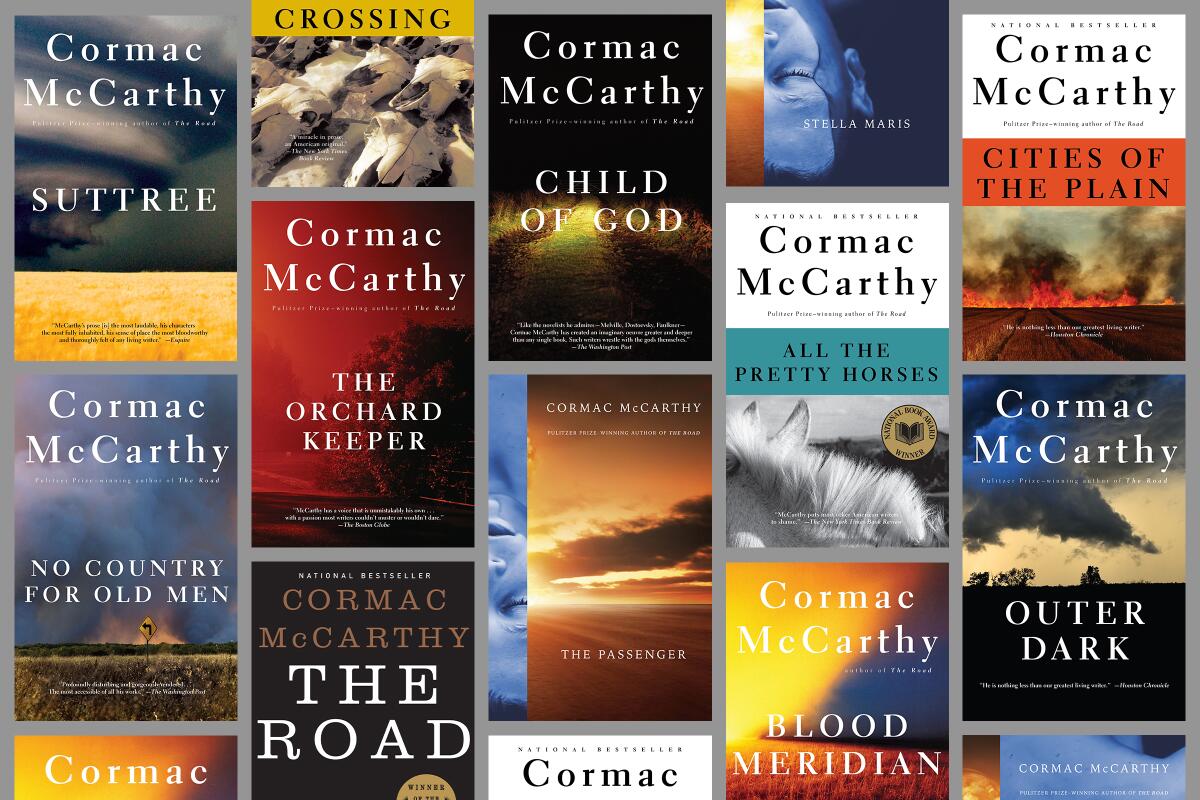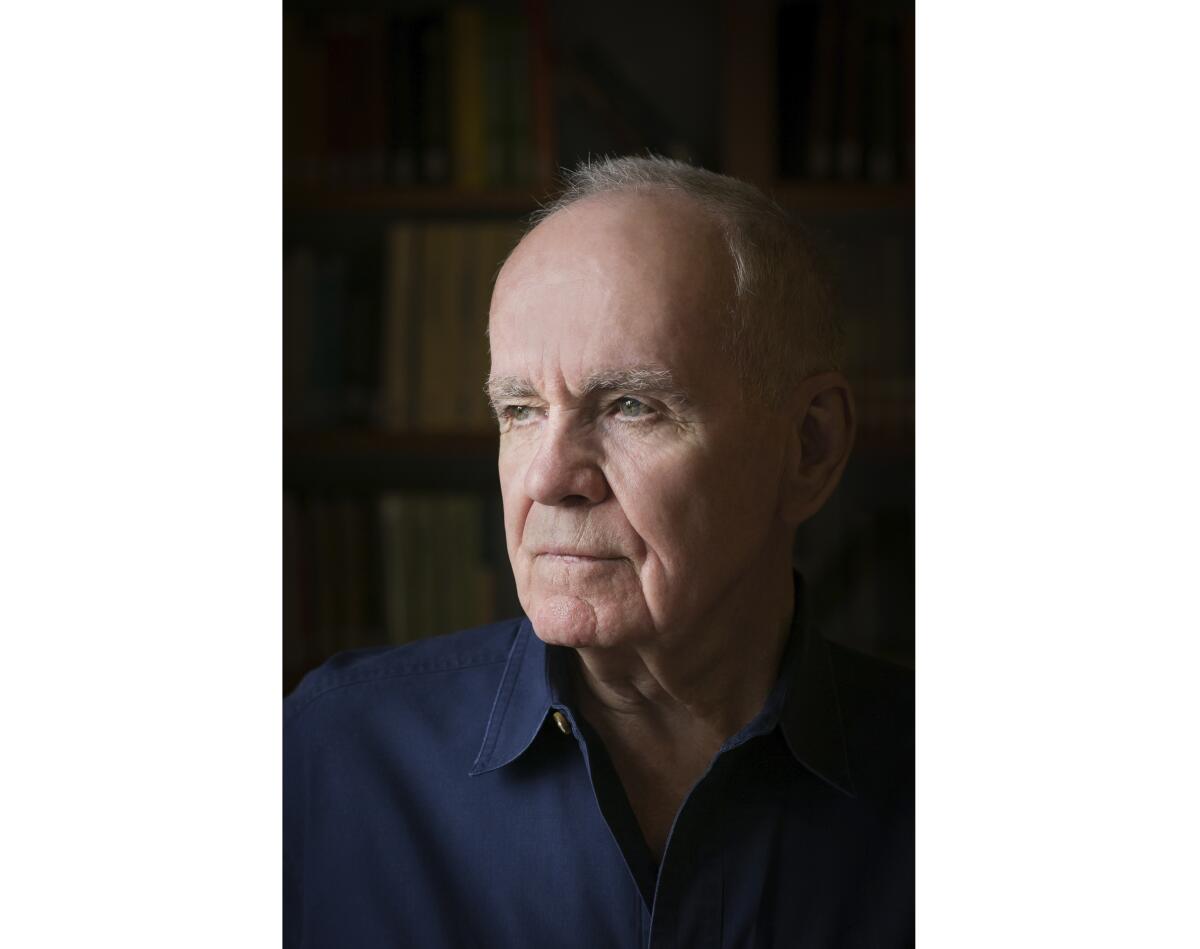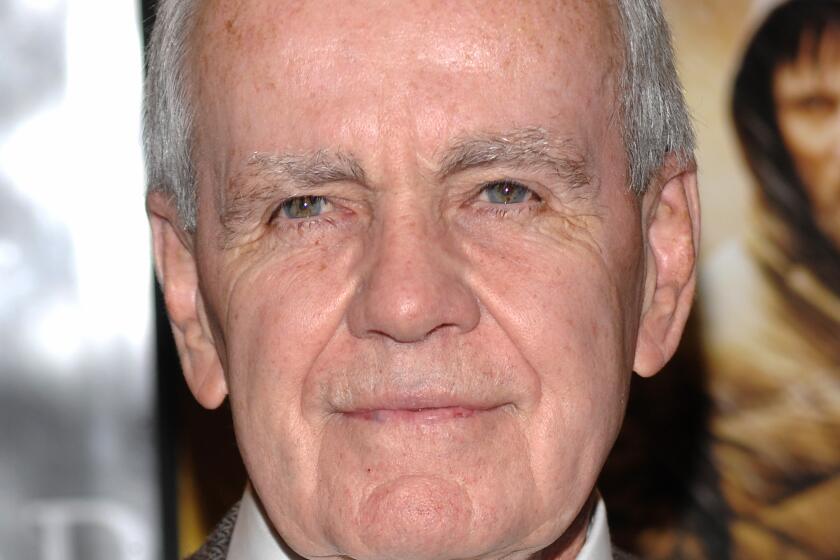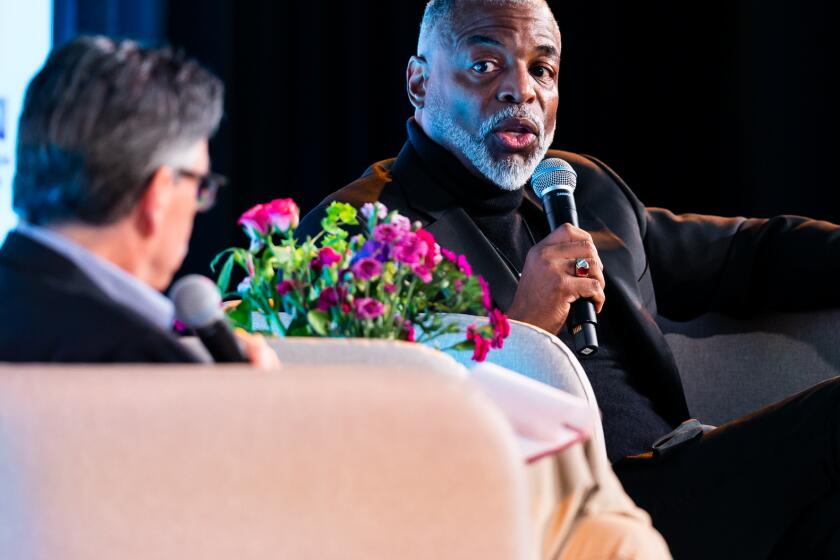Appreciation: I thought I was done with Cormac McCarthy, but he wasn’t done with me

How Pulitzer Prize-winning novelist Cormac McCarthy, author of “The Road” and “Blood Meridian,” seduced our imaginations and illuminated a path through the darkness.
- Share via
I was looking for something to read at a bookshop in London’s Heathrow Airport last October when I spied Cormac McCarthy’s 2022 novel “The Passenger.”
The early buzz about “The Passenger” was that it was a very good book — maybe even a great one — about a salvage diver named Bobby Western who makes a startling discovery inside a sunken jet.
But I wavered. I’d given up on McCarthy. In the parlance of dating we’d drifted apart, we wanted different things from books, it wasn’t him but me. It turns out I was wrong.
I first read McCarthy, who died Tuesday at 89, when I was in college. My start was “Child of God,” McCarthy’s third novel, about a serial killer in Sevier County, Tenn., which was about 200 miles from where I was going to school in southwest Virginia.

The university offered classes on Appalachian culture, where I learned about Pentecostal preachers who drank strychnine and took up serpents, but “Child of God” was far freakier. Its perverse protagonist, Lester Ballard, reveled in the kind of abominable behavior that more genteel writers like William Faulkner danced around. I didn’t know of anyone — alive or dead — who wrote like McCarthy. I didn’t know you were allowed to write like McCarthy.
By the time I got around to “Blood Meridian” I’d moved West and was in graduate school in northern Arizona. I was surprised to learn that the writer who’d perfectly captured the Gothic horror of kudzu-strangled hollers had embarked on a project to rewrite the mythology of the American West.
The author’s 12th novel, ‘Stella Maris,’ publishes on Tuesday. It’s high time for a complete reader’s guide to the Western novelist, from ‘The Crossing’ to ‘The Passenger.’
None of this prepared me for the orgy of racial violence that is “Blood Meridian,” much of which I read during a cross-country road trip. I’ll never forget the scene that takes place after a battle where some of the combatants sodomize the dead. I put the book aside and looked out the window at the vast endlessness of Texas and felt as low as I’ve ever felt. McCarthy has a knack for describing the very worst human behavior in a way that implicates us all.
“The Road” was unavoidable thanks to the endorsement of Oprah Winfrey’s book club. (It also won a Pulitzer.) My wife, Nuvia, and I read the novel simultaneously, meaning we read the same copy at the same time. We simply couldn’t put it down. I remember sitting in a taco shop together, devouring the prose while our food got cold. That night we talked about what we’d do if the world as we knew it ceased to exist.
After “The Road,” I felt that McCarthy no longer belonged to me, to us. He belonged to Oprah. He belonged to Viggo Mortensen, who played the novel’s protagonist in the inevitable film adaption. The writer who’d seized the imagination of those who liked their literature shot through with unrelenting darkness belonged to the masses now.
Stephen King and others honor author Cormac McCarthy, who died of natural causes on Tuesday at age 89.
This feeling was amplified when the Coen brothers’ adaptation of “No Country for Old Men” won four Academy Awards. Maybe it’s the instinct hardwired into my brain by my Gen X upbringing to reject things that become too popular, too cool, but I felt as though I was done with Cormac McCarthy.
I wasn’t a grad student anymore. There were voices beyond the canon to discover. I left Lester Ballard, the Judge and Anton Chigurh to the next generation of fans. It’s not like McCarthy was putting out more novels.
That all changed last fall with the arrival of not one but two new McCarthy novels — “The Passenger” and its follow-up, “Stella Maris.”
I reluctantly picked up “The Passenger” and one jetlagged night in Barcelona I began reading the book almost out of a sense of obligation.
I read until the sun came up and realized I’d been wrong about my relationship to McCarthy. Not only did he still have plenty to offer, but McCarthy’s prose felt more relatable than ever before. “The Passenger’s” New Orleans setting and colorful characters recalled to mind Barry Gifford’s Southern Nights trilogy and its braided conspiracies reminded me of Thomas Pynchon.
I wasn’t in Barcelona for any particular reason. I’d accompanied Nuvia on a work trip. I had no itinerary. No duties. Instead of strolling down Las Ramblas or exploring the Gothic Quarter I stayed in our hotel and fell under the novel’s spell.
With 50 pages left, I hunkered down in a neighborhood bar in Sarria and finished the book. When I looked up I wasn’t sure where I was in the world. I’d completely lost myself in the novel the way one can when the reader is very young or the writer is a master. I was enchanted by McCarthy’s prose but also by Bobby Western’s quest for answers he knows will always remain just out of reach.
I don’t think it spoils anything to say that the novel ends with Western in Formentera, an island south of Ibiza, Spain. Just as I’d started my journey with McCarthy in close proximity to the novel’s setting, my smartphone told me I wasn’t all that far from where “The Passenger” ends.
The L.A. Times Book Club has hosted Barack Obama, Billie Jean King, Tracy Kidder, Amanda Gorman, Susan Orlean, Jane Goodall, Viet Thanh Nguyen, Luis J. Rodriguez, LeVar Burton.
But I didn’t need to go to Formentera to make my experience of “The Passenger” more real. McCarthy had once again seduced my imagination into going places it wouldn’t have reached on its own.
That’s the magic of McCarthy: His incantatory prose can transport the reader across time and space into a universe every bit as morally complex as our own. For better or worse, one emerges from a McCarthy novel with new knowledge about the way the world works; it’s up to the reader to decide what to do with that information.
McCarthy is no longer with us to light the lantern, but as long as his books are in print his prose will continue to illuminate a path through the darkness.
Jim Ruland’s new novel is “Make It Stop.”
More to Read
Sign up for our Book Club newsletter
Get the latest news, events and more from the Los Angeles Times Book Club, and help us get L.A. reading and talking.
You may occasionally receive promotional content from the Los Angeles Times.










